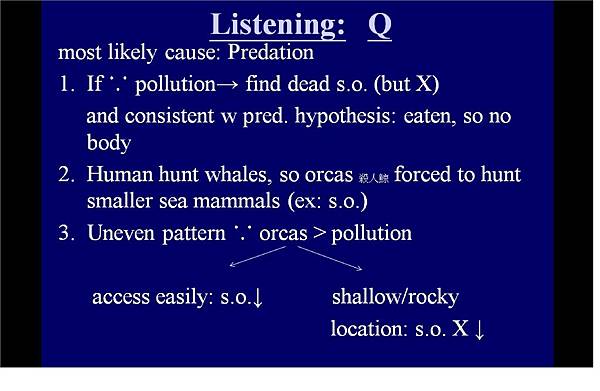![]() Hey guys, 本週作業解答如下:慢慢享用囉
Hey guys, 本週作業解答如下:慢慢享用囉 ![]()
![]()
![]()

p.5 [檢討時,記得分析該句為 real / unreal 等 5 種當中的哪一種喔]
1. can stay
2. had seen
3. would be
4. expands
5. would have received
6. had not torn off
7. tidies
8. would you do
9. were
10. wait
11. has
12. would give
13. had gone
14. finds
15. were
16. would eat
17. go
18. would go
19. would know
20. goes
p. 7
1. Should you need some more money, ....
2. Were I your teacher, I would.....
3. Should my boss call, please ....
4. Had I thought of the right words, I would .....
5. Were I a millionaire, I would not .....
6. Should they run out of tickets, we will....
7. Should you change your mind, let.....
8. Had you known my dad, you would.....
9. Had you seen the bird dancing, you would....
10. Were I a movie star, I could .....

p. 10
9. Clear: The hearing, which had been planned for Monday, December 2, was rescheduled for the following Friday so that all witnesses would be able to attend.

接著是:模考的整合寫作(閱讀部分已在上課講義, 這邊不附上囉 ~)
檢討步驟如下,包含:
1) 聽力 shadowing;
2) 改正自己模板背錯,或試著糾出文法錯誤的部分;
3) 研讀老師的 sample answer, 學習不錯的句型結構,用字, 或片語;
4) 最後加強印象, 重打一次sample essay囉!
Remember: The more effort you put towards it, the higher your final score will be. Go Go Go! ![]()
Script
Well, ongoing investigations have revealed that predation is the most likely cause of sea otter decline after all.
First, the pollution theory is weakened by the fact that no one can really find any dead sea otters washing off on Alaskan beaches. That's not what you would expect if infections caused by pollution started killing a lot of otters. On the other hand, the fact that it's so hard to find dead otters is consistent with the predator hypothesis. If an otter is killed by a predator, it's eaten immediately so it can't wash up on shore.
Second, although orcas may prefer to hunt whales, whales have essentially disappeared from the area because of human hunters. That means that orcas have had to change their diet to survive and since only smaller sea mammals are now available, orcas have probably started hunting those. So it probably is the orcas that are causing the decline of all the smaller sea mammals mentioned in the passage - the seals, the sea lions and the sea otters.
And third, the uneven pattern of otter decline is better explained by the orca predation theory than by the pollution theory. What happens to otters seems to depend on whether the location where they live is accessible to orcas or not. In those locations that orcas can access easily, the number of sea otters has declined greatly. However, because orcas are so large, they can't access shallow or rocky locations, and shallow and rocky locations are precisely the types of locations where sea otter populations have not declined.
號外!這週特別加碼送老師的「閱讀聽力綜合筆記」。請~看~

Sample Answer
By Holly Lin (314 words)
The author talks about the cause of the decline of sea otters, and points out that pollution seems to be the main reason. The speaker, however, suggests that predation ought to be the deciding factor behind this phenomenon.
First, the writer mentions that oil rigs and other sources of industrial chemical pollution are indeed found along the Alaskan coast, and thus could have decreased the sea otter's resistance to diseases, further resulting in its decline. In contrast, the professor reminds that if this were the case, dead sea otters could have easily been seen along the shore, and since this did not happen, the predator hypothesis seems to be more persuasive, as it suggests that sea otters were eaten immediately after they were killed.
Second, the writing passage argues that the pollution theory applies as the entire ecosystem in the region seems to be affected, with the population of seals, sea lions and sea otters decreasing at the same time. Besides, although orcas may have been the cause of such large scale decline, these predatory creatures prefer hunting larger preys such as other whales; thus the predator hypothesis can be safely ruled out. Yet the speech points out that orcas can actually be the real cause behind this large scale reduction of multiple species, due to the fact that whales have decreased greatly in number because of human hunters, thereby forcing orcas to change their eating habits and hunt smaller preys.
Thirdly, the article states that the uneven pattern of otter decline suggests that ocean currents may have led to uneven concentrations of pollutants along the coast. However its listening counterpart refutes this belief, by stating that the uneven pattern can be better explained by the predation theory; in other words, orcas are large creatures and have trouble accessing shallow or rocky locations, which are exactly areas where sea otters are stable in number.
![]() Keep Practicing, as always.....
Keep Practicing, as always..... ![]()



 留言列表
留言列表


